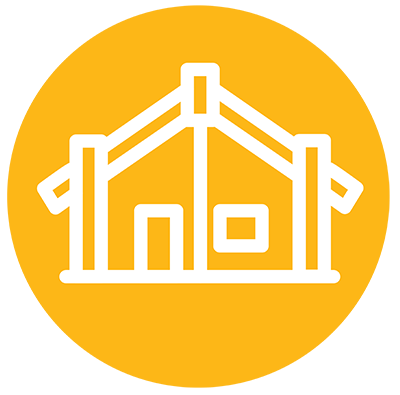
De'arna Sculley (Tainui Waikato, Ngāti Apa, Ngāti Pākehā)
Project Manager, Māori Mental Health and Addiction
Tēnā koutou katoa
Ko Arapueru me Paraekaretu ngā maunga
Ko Waikato me Rangitikei ngā awa
Ko Tainui Waikato, Ngāti Apa me Ngāti Pākēha ngā Iwi
Ko Te ākitai o Waiohua, Ngāti Mahuta, Ngāti te Wehi, Ngāti tauira ngā hapū
Ko Pūkaki me Paranui ngā pa
Ko Richard Harmer, Claude Clifford Marsh, Robert Kiriona Williams me Waatarauihi Napi Takaanini oku tūpuna
Ko De’arna Sculley Ahau
What was your path to this role?
My passion is Māori mental health and the improvement of health for Māori. I’ve been working in mental health for 23 years, and in Māori mental health for around 12 years. I have worked within specialist Māori Mental Health Team Te Whare Mārie in Wellington, and its since-disestablished equivalent, Oranga Hinengaro in Hutt Valley.
More recently I worked in health education, as I felt could make more significant changes by teaching a new workforce. I worked at Whitireia New Zealand for six years as a tutor in the postgraduate Nursing Mental Health and Addiction paper.
My thesis explored wairua, the spiritual practices of Māori mental health clinicians working in Māori mental health environments, this was kaupapa Maōri research. My hope was to validate the importance of spirituality for Maōri in recovery.
I was born and raised in the Hutt Valley and have lots of connection to this area as my hometown and my community.
What drew you to this role?
Working in ED I saw first-hand how unwell some of our people are. I noticed how many missed opportunities there were to intervene early and improve outcomes for our people. It’s often too late by the time people come into ED.
I believe that this role has the potential to make a real positive change at a whole different level and make a difference for so many more people. It’s about equity, change and improving health outcomes.
What are your hopes for the change programme?
Everyone I’ve spoken to about the possibility of a kaupapa Māori mental health service in the Hutt Valley is 100% supportive. It's important to connect with other workstreams, as we are part of the bigger picture of change. I am looking forward to building connections with other project teams, to make sure the goal of equity is achieved across the change programme. It needs to be front and centre of all our planning.
The wider change programme has real potential to make a difference. There’s some really exciting innovative thinking, like the role of peer support and the Mental Health and Addiction crisis support (MHACS) work. In fact, I have also worked in the MHACS role, as a Nurse Educator in Hutt ED.
One of my other passions is the wellbeing of staff, and I’m looking forward to seeing the new workforce development strand take its place in the programme.
Tell us about the Māori Mental Health and Addiction workstream.
While consultation with Māori will occur at all levels of the change programme, the Hutt Valley kaupapa Māori mental health service gives precedence to the health inequities that exist in Te Awakairangi for Māori whānau presenting with mental health difficulties.
The consultation process with the local community will be pivotal in the development of the needs for Māori, with specific input from key stakeholders and Iwi. This will demonstrate a changed mindset and a different approach to mental health for Māori that is community-led.
It is projected that a whānau ora approach to recovery will be led by specialist Māori kaimahi and Māori mental health clinicians using the foundation of kaupapa Māori models of health and recovery.
What are your plans for the next few months?
I’m new to the role and am loving the position so far. I’ve been around Hutt and Capital & Coast mental health services for a some time and I am excited to be working with some great people.
Over the next few weeks I’ll be connecting with Iwi and the wider Māori community, and finding out what’s happening with our whānau. I’ll also build an understanding of the landscape – which services are out there.
I plan to organise a community hui with as many stakeholders as possible and see what the local community wants to see for Hutt-based services. These conversations will shape the work. With a process like this, it’s important to get it right. It’s a huge privilege and a huge responsibility.